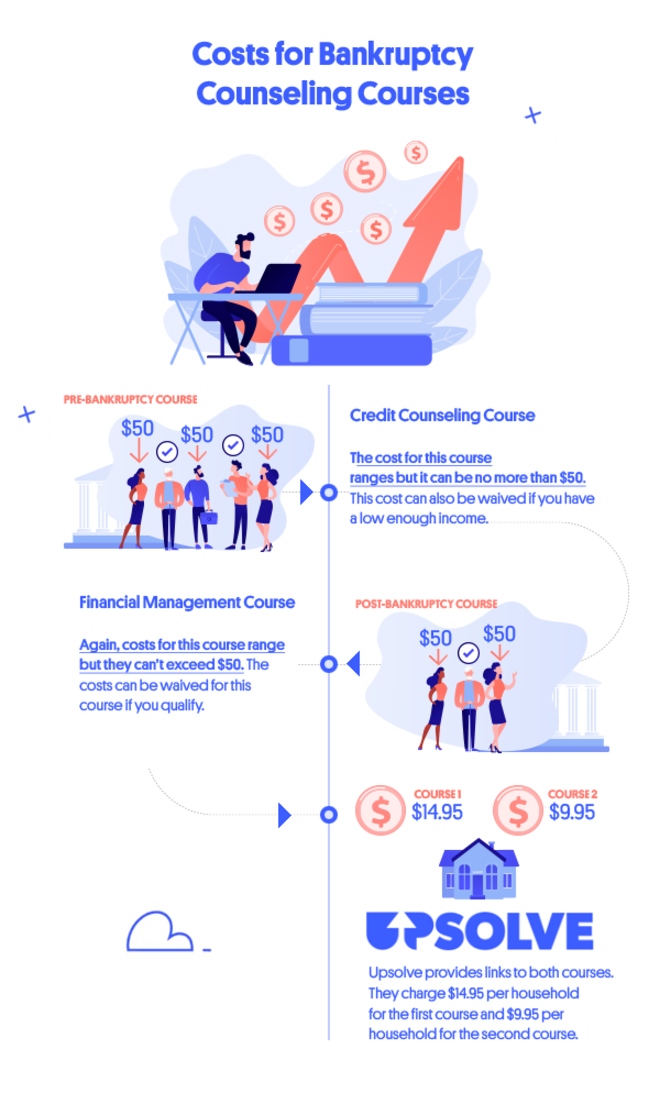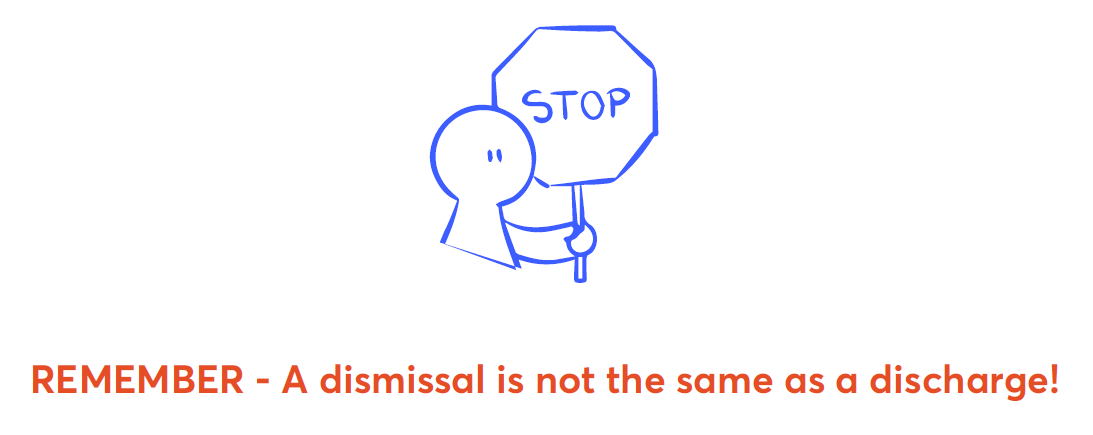Bankruptcy Credit Counseling & Financial Management Courses
3 minute read • Upsolve is a nonprofit that helps you get out of debt with education and free debt relief tools, like our bankruptcy filing tool. Think TurboTax for bankruptcy. Get free education, customer support, and community. Featured in Forbes 4x and funded by institutions like Harvard University so we'll never ask you for a credit card. Explore our free tool
If you’re filing bankruptcy to wipe away your debt you’ll need to take two educational courses. A credit counseling course before filing your case and a financial management course after filing.
Written by Attorney Andrea Wimmer.
Updated January 5, 2021
If you’re considering bankruptcy to wipe away your debt and are researching your options, you probably know that you’ll have to complete the bankruptcy forms. But that’s only part of the process for getting a fresh start. You’ll also need to take two educational courses. One before and one after filing bankruptcy. This is required by the Bankruptcy Code. There is usually a small cost for this counseling service, but bankruptcy law requires that anyone who can't afford to pay the cost can apply for a fee waiver.

Course 1: The Pre-Filing Credit Counseling Course
Everyone filing bankruptcy has to complete a pre-bankruptcy credit counseling course through one of the approved credit counseling agencies. The U.S. Trustee Program determines the approved providers for each judicial district in all but two states.
Alabama and North Carolina don't have a U.S. Trustee. There, the bankruptcy administrator decides which nonprofit organizations may provide credit counseling to filers.
During the credit counseling session, you'll speak with a credit counselor about your financial situation. Once done, they may recommend that you consider a repayment plan but oftentimes they'll simply provide you with the bankruptcy certificate to submit to the court along with your bankruptcy forms. The certificate is how you prove to the court that you’ve completed the course.
Is credit counseling required for Chapter 7?
Yes, individuals who file any type of bankruptcy (Chapter 7, Chapter 13, or Chapter 11) have to complete this requirement. The credit counseling requirements exist to make sure that everyone filing bankruptcy knows about all available debt relief options.
How do I get a certificate of credit counseling? How long is it good for?
You get the certificate of completion after you’ve completed the course. It’s good for 180 days.
I’m not sure if I’m filing bankruptcy. Is credit counseling a good idea?
Yes, because as with everything in life, knowledge is power. Even if you don’t end up filing a bankruptcy case, a credit counseling session with an accredited nonprofit provider can help you figure out your next steps. It may help clarify whether bankruptcy is a good idea for someone in your situation.
How long is the credit counseling course?
There is no set duration for the credit counseling session as everyone’s case is a bit different. The Executive Office of the United States Trustee (“EOUST”) states that “sessions should last approximately 60 minutes.”
Upsolve Member Experiences
1,997+ Members OnlineCourse 2: The Pre-Discharge Debtor Education Course
Before the court will grant your bankruptcy discharge, you have to complete a so-called "debtor education course." Again, it’s important to take this course from an approved provider.
What is debtor education? What is a personal financial management course?
Both of these terms are used interchangeably to refer to the second bankruptcy counseling course. It’s meant to teach you how to better manage your finances, for a more successful financial future. This counseling session will focus on things like:
personal financial management
budgeting
how interest rates work
rebuilding your credit report
using credit cards
Of course, this instructional course is required even if the reason for your bankruptcy filing had nothing to do with your financial management skills.
When should I take my second bankruptcy course?
The second bankruptcy course has to be completed after your case is filed. In fact, you’ll need your bankruptcy case number to even sign up for the course. From there, it’s really your preference how quickly you want to get this requirement over with. Most people complete it before their 341 meeting, so they don’t have to worry about it after that. Filers who forget to complete this financial education course aren't eligible to have their debts eliminated.

If you don’t take the course and submit your certificate of completion to the court within 60 days from your creditors’ meeting, your case may be closed without a discharge. Since getting a discharge is your primary goal in filing Chapter 7 bankruptcy, you’ll want to avoid that by getting the course done and the certificate filed.
How long is the post-filing debtor education course?
Even though there’s no set curriculum, the rules require certain topics regarding personal finance, financial literacy, and money management be covered. As a result, the debtor education requirement is a 2-hour course.
When done, you'll receive a certificate of completion that you have to submit to the bankruptcy court.
How to Find Approved Providers
You can find a list of nonprofits approved to offer credit counseling and debtor education courses in your state on the website of the U.S. Trustee Program (or the bankruptcy administrator's website if you're in Alabama or North Carolina). Make sure you're looking at a .gov website when searching, so you know you can trust the referral.
Many Upsolve users go through the DebtorCC to complete their credit counseling and debtor education courses, but you can choose any one of the approved nonprofits. If you’re in a bigger state, make sure that the company you choose is approved for the specific judicial district you’re in.
The United States Trustee Program’s list of approved nonprofits for the pre-filing credit counseling course is available here. Their list of approved debtor education course providers can be found here.
Let’s Summarize…
Everyone has to complete a pre-bankruptcy credit counseling course before and a pre-discharge debtor education course after filing their bankruptcy case. You have 6 months to take the pre-filing course. Once your forms are filed with the bankruptcy court, you’ll want to get the second course done within 60 days of your meeting of creditors (or before the meeting, if you want). The courses are offered by nonprofit organizations that are pre-approved by the U.S. Trustee (or the bankruptcy administrator).
